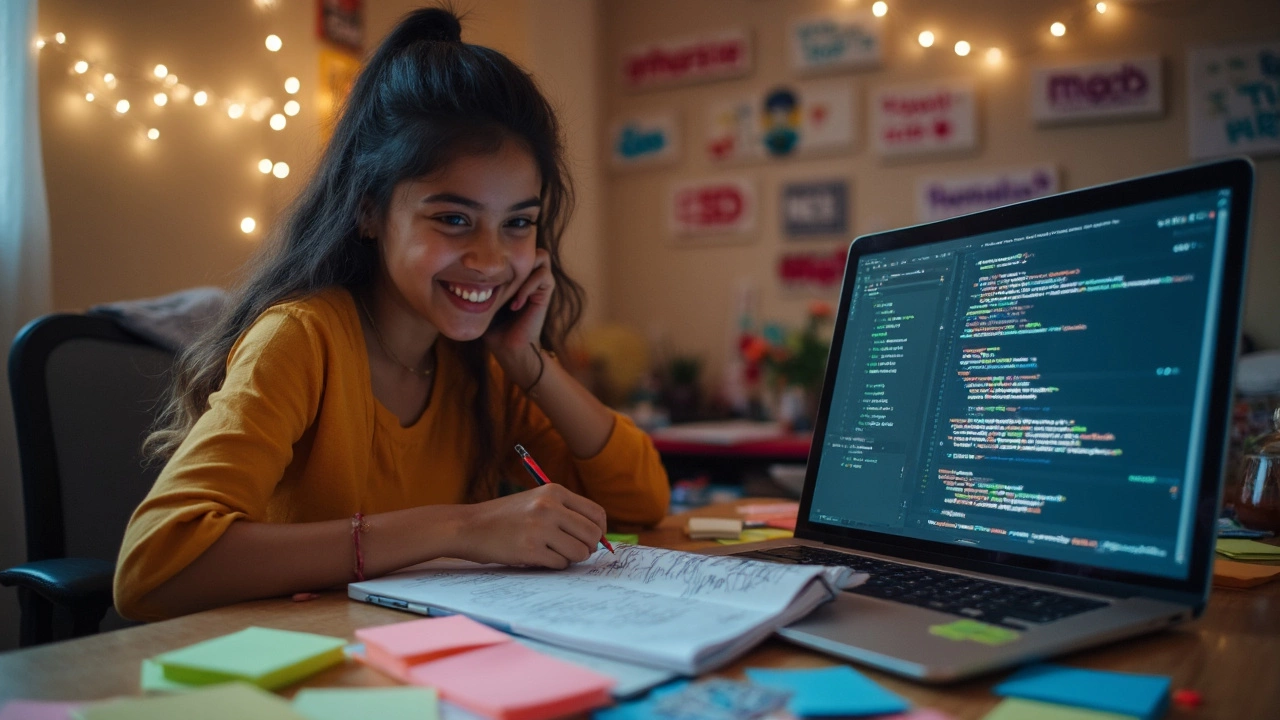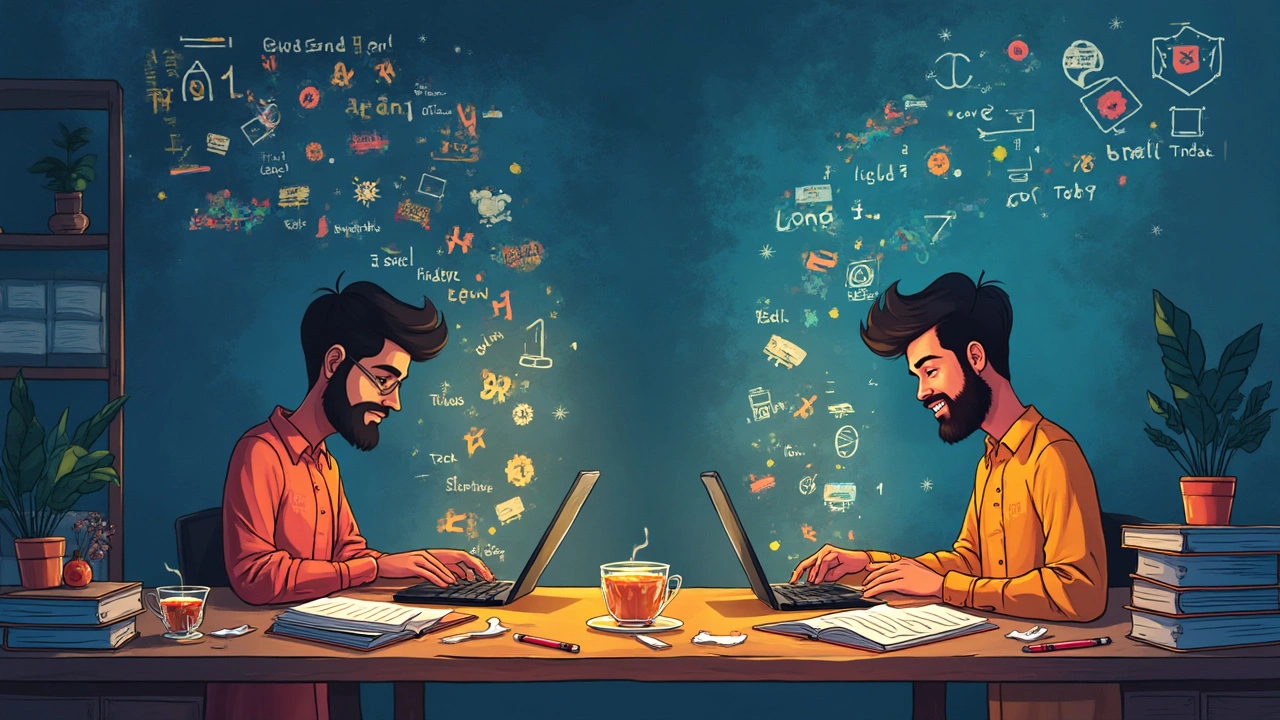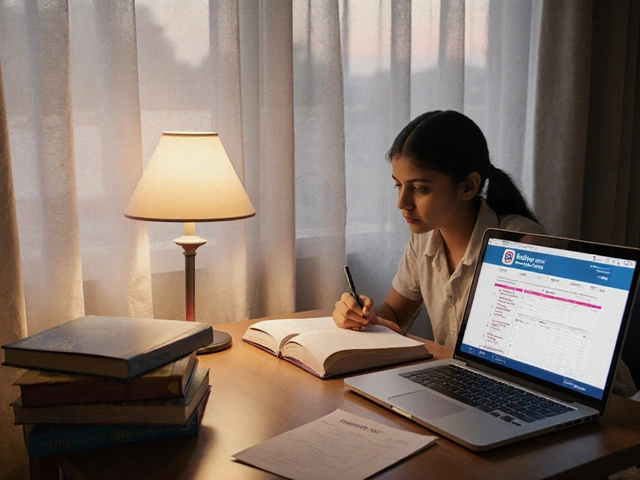
The first weeks of learning to code feel like wrestling with a new language where nothing quite sticks. One line missing a semicolon? Your program crashes, and you’ve got no clue why. Tutorials make it look breezy, but in reality, you might spend an hour staring at one error message. That’s completely normal—and honestly, it has nothing to do with intelligence or talent. Coding is less about memorizing and more like developing a weirdly specific sense for patterns and logic.
Here’s the truth: everyone, even pro developers, has horror stories from when they started. The “this is hard” stage feels brutal for basically everybody. You’re not alone, and you’re not behind. If you’ve ever wanted to throw your laptop out the window, welcome to the club. But there are ways to get through those tough days—you’ll find your own tricks and shortcuts as you put in the hours. Stick with it a while and even the stuff that looked impossible starts making a weird kind of sense.
- The Early Struggles: Why Coding Feels So Hard At First
- Plateaus, Breakthroughs, and Weird Brain Tricks
- Does Advanced Coding Ever Get 'Easy'?
- Tips That Actually Help Make Coding Easier
- Why You Should Stick With It (Even When It Sucks)
The Early Struggles: Why Coding Feels So Hard At First
If starting to learn coding feels more like banging your head against a digital wall, you’re not imagining it. The main reason is simple: most people aren’t used to thinking like a computer. You’ve got to master a new way to break big ideas into tiny, precise steps, and computers take everything literally. Forget a bracket or mix up a variable, and your whole program can freeze or spit out nonsense.
Syntax trips everyone up. Think of syntax as the rules of the road for programming languages—it’s not enough to get the logic right; everything needs to be in the right spot, right character, right case. If you’re used to English or other spoken languages, you might fudge details and still be understood, but a computer? Not happening. That’s why beginners often find that their code fails for what seem like tiny, silly mistakes.
Another big hurdle is the invisible stuff—errors and bugs. You’re suddenly working in a world that tells you things like “NullReferenceException” or “Segmentation Fault,” which sound more like a medical emergency than a learning issue. New coders spend a shocking amount of time fixing errors instead of writing something new. A 2023 Stack Overflow survey found that beginners spend about 60% of early coding time just debugging and Googling error messages.
Then there’s the overwhelming choice. There are dozens of coding languages. Should you start with Python, JavaScript, C++? That rabbit hole can eat hours. Truth is, the first language matters a lot less than sticking with any one and actually finishing some small projects.
Here’s what makes it a little easier:
- Start with the basics—variables, loops, and functions are the same across most languages.
- When you get an error, copy-paste it into Google or a site like Stack Overflow. Chances are, someone else hit the exact same wall.
- Don’t cram too much too fast. Practice for 30-45 minutes a day instead of trying to code for hours straight. This helps your brain absorb the new patterns.
- Make goofy, simple projects you care about. A calculator, a basic web page, even a random joke generator can make learning less boring.
Nobody becomes a pro overnight. If you’re patient through the rough patches and give yourself permission to make loads of mistakes, you’ll notice it starts getting easier—slowly, but for real.
Plateaus, Breakthroughs, and Weird Brain Tricks
Once you start getting used to coding, there’ll be days when it just clicks—like suddenly understanding how loops actually work, or finally getting your first function to behave. But a lot of the time, it feels like you’re stuck on a plateau, grinding away and not really seeing improvement. That’s normal. In fact, studies from Carnegie Mellon’s Human-Computer Interaction Institute show that most new coders hit these "stuck" phases that last days or even weeks, and then out of nowhere, everything seems to level up at once.
Your brain needs time to chew on new info in the background, even when you’re not actively learning. That’s called “incubation” in learning science, and it’s a real thing. Ever notice how the answer to a coding bug pops into your head while taking a shower or going for a walk? That’s your brain quietly piecing stuff together on its own schedule. So, don’t beat yourself up—plateaus don’t mean failure, they just come with learning the ropes.
Breakthroughs tend to show up in weird ways. Maybe you start spotting bugs faster, writing cleaner code, or explaining why your programming logic finally works to someone else. Classic signs of a breakthrough include:
- Solving a problem that stumped you for days
- Recognizing patterns you didn’t see before
- Getting errors you can actually Google (because you understand what they mean)
- Needing less time to remember syntax or common functions
Here’s a quirky brain trick: switching languages or projects every now and then actually helps. Research from the University of Washington found that bouncing between different programming languages or personal projects gives your brain more hooks for remembering stuff. So if you’re bored or stuck, try building something silly—a joke app, a random number generator, whatever. It wakes your brain up, and those plateaus shrink faster.

Does Advanced Coding Ever Get 'Easy'?
Here’s the truth a lot of folks in coding classes discover the hard way: the basics eventually do get easier, but “easy” takes on a new meaning as you go deeper. At first, you stress over curly braces and semicolons. Once you nail those, the problems just get more interesting. Advanced coding is like leveling up in a game—yeah, you’ve got cooler skills, but the monsters get tougher.
Things like object-oriented programming, debugging tricky bugs, or learning new frameworks aren’t exactly a walk in the park. But your brain starts to build shortcuts. You recognize patterns faster. Google becomes your sidekick (most pros say they search for answers every single day). That’s normal! In fact, according to a Stack Overflow developer survey, over 90% of working programmers look up answers online when stuck. The difference is, you now know what to search for and which docs to trust.
Here’s what changes as you get into more advanced stuff:
- Confidence grows. You look at problems with less panic and more curiosity.
- Your toolkit gets bigger. Each language, tool, or error you’ve battled helps you next time.
- Troubleshooting habits improve. You stop guessing and start testing things in a methodical way.
- Jargon sounds less intimidating. The words that made your eyes glaze over in week one? They start to click because you’ve used them enough.
But is anything truly "easy"? Some tasks you could do in your sleep, sure. Others will still make you scratch your head—yes, even ten years in. The difference is, you don’t freeze up or give up as fast. You’ve seen enough weird bugs to know that eventually, you’ll figure it out.
What keeps things fresh is how often everything changes in programming. New coding languages, updates, and frameworks are always popping up. If you like solving new kinds of puzzles, this is what keeps it from being boring—just don’t expect to feel "done" learning anytime soon.
Tips That Actually Help Make Coding Easier
When you’re stuck staring at buggy code, it’s easy to think you just aren’t cut out for coding. The good news? Most people who get better at it just pick up a few real-world habits that make a huge difference.
- Break big problems into smaller parts. Don’t try to solve everything in one go. Have a massive assignment? Get just one function working, then move on to the next. You’ll tackle things chunk by chunk and feel less overwhelmed.
- Google is your friend. Seriously. Typing in error messages or questions (“how do I loop through an array in Python?”) isn’t cheating—pros do it every single day. Just don’t copy-paste code blindly. Try to understand what it does first.
- Use print statements (or their equivalent) a lot. Sprinkle them in your code to see what’s actually going on at each step. Debuggers are awesome, but sometimes just seeing what a variable equals in real time will save you hours of pain.
- Practice with real problems. It’s tempting to just follow tutorials, but real learning happens when you’re making your own tiny projects or solving random problems on coding challenge websites.
- Ask for help, but be specific. If you join an online forum or slack channel, show them the code you tried and explain what you want it to do. Don’t just say “it’s broken.” You’ll get better answers and learn faster.
How long does it take before you start feeling ‘fluent’ in programming? Based on a 2023 survey of adult students in top coding classes, here’s a ballpark look:
| Hours Spent Coding | Confidence Level |
|---|---|
| 0-20 | Hugely lost |
| 21-50 | Some puzzles start to click |
| 51-100 | Can tackle simple tasks solo |
| 100+ | ‘I know what to Google’ energy |
Most experts agree that consistent, even short, daily practice beats a once-a-week cram session. And if you ever feel like you’re not progressing, try teaching a concept to someone else—it’ll make those learning to code gaps really obvious (and help you fill them fast).

Why You Should Stick With It (Even When It Sucks)
Here’s something a lot of people won’t say: almost everybody feels like quitting coding at some point. Crashing programs, confusing bug reports, cryptic error messages—they knock your confidence, especially early on. But the payoff for sticking it out is real, and there’s actual proof it pays off if you just keep at it. Studies from Stack Overflow and Codecademy show that people who spend just 30 minutes a day coding, even if they feel totally lost, make massive progress within a few months. The hardest part isn’t the code. It’s just not giving up after getting stuck for the hundredth time.
There’s some pretty unique rewards only coders get. First up, every small win (like getting a stubborn function to work) gives you a boost. That’s real learning, and it builds up. On top of that, coding opens job paths and creative projects even for beginners. Did you know that the demand for entry-level programmers keeps growing? According to the U.S. Bureau of Labor Statistics, there’s an expected 25% growth in software developer jobs by 2032.
If you want something more concrete, check out how fast coders improve just by sticking with it:
| Months of Practice | Average Projects Completed | Self-Reported Confidence Level |
|---|---|---|
| 1 | 2-3 basic scripts | Low |
| 3 | 5-8 small apps | Moderate |
| 6 | 10+ projects | High |
You’ll notice that most coders feel way better about their skills just a few months in—if they haven’t thrown in the towel. And honestly, no class or tutorial works without just showing up and trying. That boring repetition? It’s what builds your “programmer brain”—the same way practicing free throws makes you better at basketball.
- Take regular breaks. Burnout is real in programming. Short breaks help you bounce back from frustration.
- Track progress. Keep screenshots of old projects. When you look back, you’ll actually see how far you’ve come.
- Ask for help! Online forums, Discord, or even a friend doing coding—chances are, they’ve run into your exact problem.
- Mix it up. Try building something fun alongside your assignments. It helps keep you curious and less stressed about mistakes.
As cheesy as it sounds, consistency beats talent in learning to code. Don’t worry if you’re not a “natural.” Half the pros out there started off googling simple things like “how do I print text in Python?” The real win is just pushing through one rough patch at a time.




